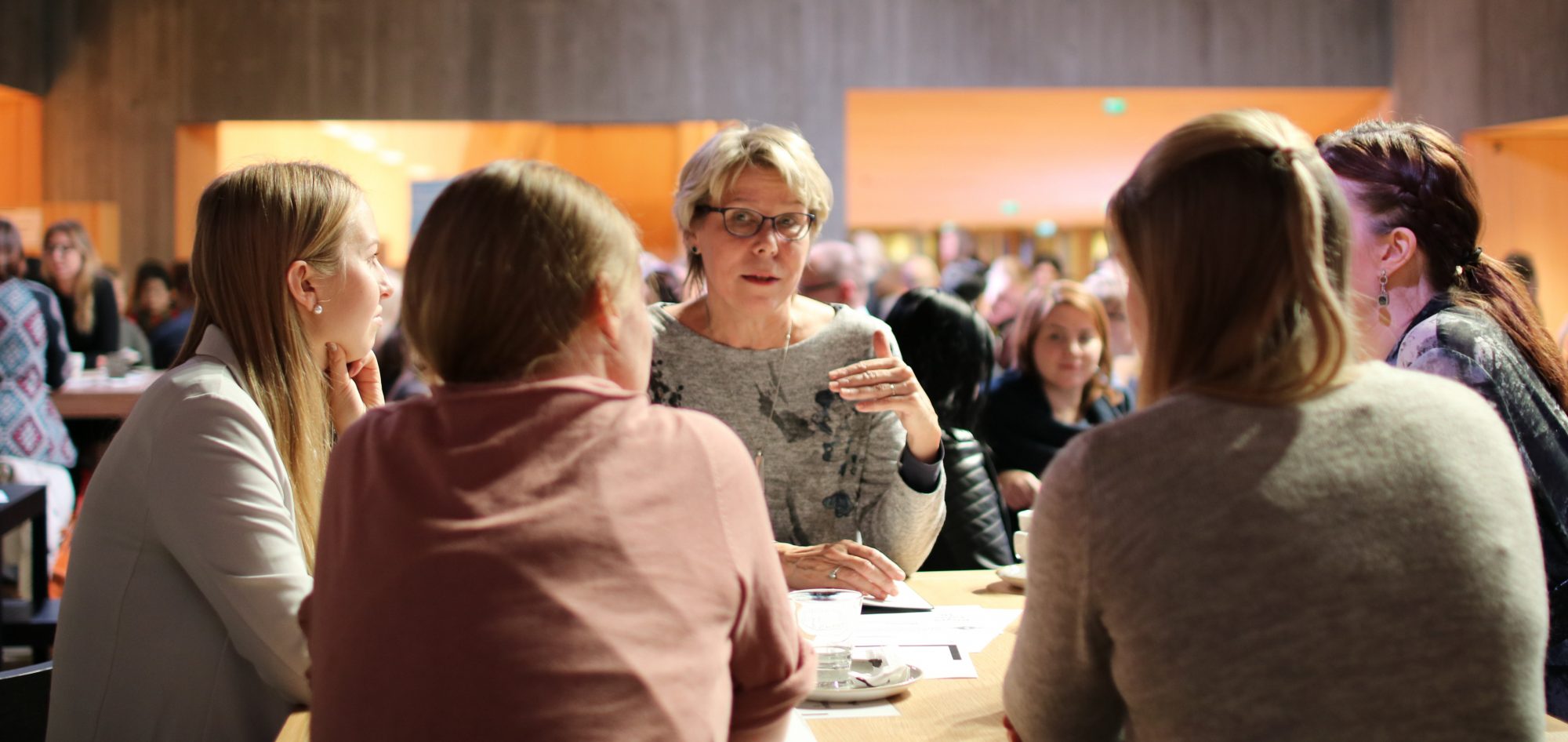(For information on how to apply, please see the Apply to the programme page)
In the University of Helsinki Group mentoring programme, an alumni mentor works with an interdisciplinary group of 3–4 students (actors) for about 5 months. In addition to the support provided by the mentor, the actors receive peer support from each other.
Group mentoring begins with a joint Kick-off event for all groups where both mentors and actors receive information and support for launching group activities. Group members meet each other for the first time in this event and, during the evening, each group decides on its own meeting schedule. The groups should meet roughly once a month during the program.
Group goals recorded in mentoring agreement
Mentoring is always based on the goals set by the actors. Each actor determines his/her personal goals already during the application stage. Why do I want to take part in mentoring? What do I expect from it? What do I want to learn? The answers to these questions will guide which mentoring group the student will apply to in the first place.
Each mentoring group plans its themes, topics and activities independently, which is why actors should openly discuss their personal goals with each other and their mentor at the very beginning. The group must collectively identify their objectives and the contents of their activities and work as a team that is responsible for mentoring together, even though individual actors may also have various mentoring goals of their own.
A shared notion of the group goals should be recorded in the mentoring agreement at the latest during the meeting following the Kick-off event. The mentoring agreement contains the group’s own schedule as well as the goals, contents, and rules of group activities. The agreement ensures that the members of a group have a shared notion of what the group is trying to achieve and how.
The group mentoring is based on confidentiality. This means that group discussions may not be disclosed to outsiders without mutual agreement. A mentor or an actor needs to give his/her consent before an opinion, question, or concern presented by him/her can be shared with outsiders.
Planned and documented sessions
It is important that the topic(s) of each group session are planned in advance. This way, the mentor and the actors can orient themselves for the session, and the time together is not spent “just chatting”. The sessions can be informal and some changes will certainly happen along the way, but planning guarantees that there is enough time to discuss the topics agreed upon together.
The theme(s) of the first session are planned during the Kick-off event. After this, the main responsibility for planning and organising each session lies with the actors. The actors plan the topics that will be discussed during the next session at the end of each session or between meetings. The actors take turns to write a short summary of the group session and deliver a session memo describing the contents of the session to the other members of the group.
Tips for mentoring sessions
It is warmly recommended that the group utilises the assignments and questions of the Workbook for Mentoring (pdf). For instance, the following themes and questions may be discussed during the process:
1. Questions related to the actors’ career planning
What kind of work-related expectations and hopes do the actors have? What kind of tasks are they interested in? What kind of work environments do they find enjoyable?
2. Transfer from studies to work life
What has influenced the study choices of the actors and the mentor? What makes university studies interesting? What it is like to transfer to work life? How can one utilise the things one has learned during studies at work? What kind of things should one study at work and alongside one’s work after graduation? The mentor can describe his/her own career history when this theme is under discussion.
3. Opportunities, challenges, and development trends of work life?
How do the group members see the development of work life at the moment? What kind of job opportunities and future prospects are offered by the field that the actors are interested in? What kinds of networks should the actors try to form? What kind of job-hunting channels and techniques are effective? How can one improve personal well-being and endurance at work?
The group seeks answers together
It is a good idea to remember that nobody has the “correct answers” to all the possible questions. It is crucial that the actors openly describe issues that they are concerned about and that the actors and the mentor together consider these issues in light of their personal experiences.
The mentoring group may utilise e.g. the University’s Career monitoring reports or organize visits to interesting workplaces or events. The mentor may also instruct actors to directly contact experts in the mentor’s network, if these experts may have answers to questions that the actors are interested in.
Additional useful links have been gathered on the Materials page.
End of the group mentoring process
Group mentoring ends with a joint Closing Event where acknowledgements are given and where actors and mentors can assess the outcomes of the program and discuss their experiences. In the event, actors and mentors also have the chance to provide feedback to the organisers of group mentoring and thus help develop the programme. In addition, all participants receive a certificate of participation.
Actors may, if they wish, continue to meet among themselves and/or with the mentor even after the program ends, but the decision to continue cooperation must be made together. There is no obligation to remain in contact.
(For information on how to apply, see the Apply to the programme page)



